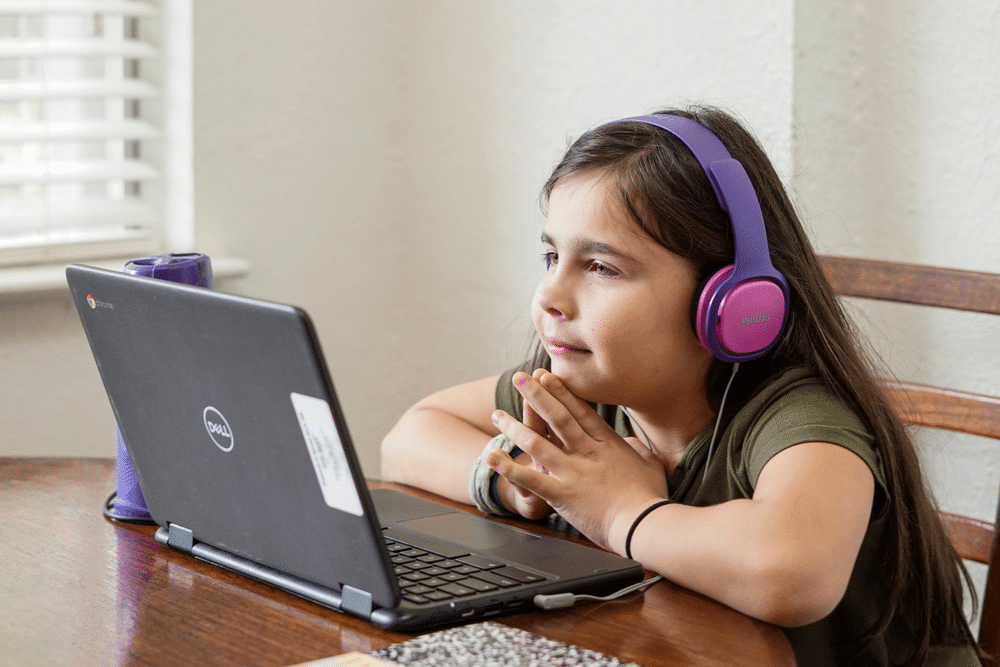 With more parents increasingly making the switch from conventional schooling to online schooling for their children, we’re observing a massive transformation in the education sector across the globe, especially in the UK. Following the COVID-19 pandemic, distance learning is popularising among students of all ages. By sending their children to a reputable online school, parents can check off a lot of boxes, e.g., safety, mental health, knowledge absorption and retention, flexibility, a healthy school-life routine, etc.
With more parents increasingly making the switch from conventional schooling to online schooling for their children, we’re observing a massive transformation in the education sector across the globe, especially in the UK. Following the COVID-19 pandemic, distance learning is popularising among students of all ages. By sending their children to a reputable online school, parents can check off a lot of boxes, e.g., safety, mental health, knowledge absorption and retention, flexibility, a healthy school-life routine, etc.
If you’re considering making the switch to online school for your child, make sure you select the right institution. Presently, parents have the option of choosing between dozens of Online virtual school UK. Instead of taking a day or two to decide, we recommend digging deeper, doing extensive research, and shortlisting the best online schools for your child. This process is imperative. If you fail to do your research, you may end up selecting an institution that isn’t right for your child. As a parent, you shouldn’t compromise on your child’s education under any circumstances.
We recommend browsing through reviews, consulting friends and family members, requesting more insight from academics you may know, and making your own checklist. As you take the time to gather more knowledge, you’ll be able to make an informed decision that helps your child receive a quality education, secure top grades, become a curious and critical thinker, and progress exceptionally well at school.
In this blog, we’ll help you create your own checklist. We’ll walk you through ten critical questions you should keep in mind as you navigate the online school selection and finalisation process. Take notes or bookmark this blog so you can keep referring to it as you search for the right online school for your child. Let’s get started.
1. Is the Student-Teacher Ratio Low?

As a parent, make sure you look for an online school that has a low student-teacher ratio. If this ratio is high, your child will be taught in a group of 15+ students. Unfortunately, many online schools have an astonishingly high student-teacher ratio (15:1, 20:1, 25:1, or even 30:1).
At Cambridge Home School, we keep the student-teacher ratio as low as possible to maximise student engagement and interactivity. Your child will be taught in a group of 8 to 10 students. This approach helps our teachers provide individualised attention to each child. They can observe a student’s unique learning habits and customise their teaching approach accordingly.
By identifying each child’s weaknesses and strengths, our teachers work assiduously to provide the customised guidance and support they need. Since the student-teacher ratio is low, our teachers are also able to keep the class on track and closely monitor each student’s engagement and participation levels.
They can immediately identify students who are losing focus and immerse them back into the class discussion in a roundabout way (i.e., without “singling them out” or making them feel embarrassed for zoning out).
This strategy goes a long way in helping students learn actively, attentively, and retentively. As a result, they perform better on their tests and secure top grades.
There’s little to no risk of the student falling behind in class. Whether they’re struggling to understand certain concepts or zoning out, our teachers can expertly provide the individualised support they need to get back on track.
Recommended: 6 Ways Online Schooling Helps Students Improve Their Grades
2. How Qualified Are the Teachers?

As a parent, make sure you look into the qualifications of the teachers at your chosen institution(s). If their qualifications aren’t specified, consider this a big red flag. Similarly, if the qualifications aren’t impressive, consider this another major red flag.
Your children shouldn’t be trusted with anyone. Their online teachers should be experienced, qualified, trained, empathetic, passionate about teaching, and adept at teaching. At Cambridge Home School, our MA/PhD qualified subject specialist teachers work assiduously to provide a quality education to each student. They have extensive experience in teaching and have meticulously mastered the “art of teaching” over the years.
We have a rigorous faculty recruitment process in place. Each prospective teacher is interviewed by a team of education specialists, senior teachers, academics, and learning experts. We also request the shortlisted teachers to demonstrate their teaching skills so we can determine whether they’re the right fit for our children. By hiring the most experienced and accomplished MA/PhD qualified subject specialist teachers, we ensure that our students are in good hands.
3. Do They Have a Well-Rounded, Independent Curriculum?
Today, many online schools follow the national curriculum, which is subject to political turbulence. In essence, it doesn’t provide children the comprehensive education they need to grow academically and secure top grades.
As you look for the right online school for your child, make sure you select an institution that offers a well-rounded, independent curriculum. At Cambridge Home School, our curriculum comprises the best aspects of the national curriculum and new facets that help children achieve an academic edge. By introducing additional elements, we make up for the gaps in the national curriculum.
Recommended: Cambridge Home School’s Independent Curriculum
4. How Do They Keep Children Engaged in the Lessons?

When making the switch from conventional schooling to online schooling, parents often worry that their children will struggle to remain focused in class. This is a justified fear. As stated earlier, many online schools have a high student-teacher ratio, which forces students to lose focus.
Not only do we have a low student-teacher ratio, but we also have a meticulous system in place to eliminate the risk of students potentially getting distracted, zoning out, or being disruptive mid-class. Our teachers are provided extensive training in keeping students engrossed in the lessons at all times. We equip them with the insights, practical tips, and improvisation techniques they need to know in order to help the students stay focused, attentive, and immersed in the lessons.
As a parent, you don’t have to worry about your child losing focus. We take the responsibility of keeping students engaged in the lessons. We understand that students can easily get distracted and veer off track, especially younger children with shorter attention spans. Children can also be recalcitrant and interruptive, affecting the flow of the class and their own learning process. Our MA/PhD qualified subject specialist teachers are trained to handle these situations and keep things on track through and through.
5. Do They Offer Scholarships and Bursaries?
If you require financial assistance, we strongly recommend checking whether the online schools you’re considering offer scholarships and bursaries.
At Cambridge Home School, our annual fee is £9,000 GBP (approx. $11400 USD / ¥81000 CNY / 42000 AED / 88000 HKD) for Lower School (Key Stage 3), Upper School (IGCSEs), and Sixth Form (A Levels). For Primary Prep School (Key Stage 2), the annual fee is £4,000 GBP.
We also provide financial support to parents who need it. You can opt for scholarships (discretionary awards for exceptional students) or bursaries (means-tested financial assistance).
Recommended: Scholarships and Bursaries Offered at Cambridge Home School
6. How Much Experience Do They Have?

In light of the COVID-19 pandemic, a plethora of new online schools have been set up. Unfortunately, many of these institutions have been established with the intention of “jumping on the online schooling bandwagon.” In other words, they don’t provide the quality of education parents are looking for.
If you’re considering sending your child to a reputable online school, select an institution that had been set up long before the pandemic started. This is a great way to ensure that your chosen online school isn’t “following a trend” but actually has an exceptional track record and extensive experience.
Established in 2002, we have 19 years of experience and counting. We’re one of the pioneers of online schooling in the UK. Our experience has enabled us to improve the quality of education we provide.
Over the years, we’ve built a strong faculty and perfected our curriculum, which is further updated and improved based on new requirements. Today, we’re trusted by thousands of parents across the globe, not just in the UK.
7. Will My Child Be Able to Enjoy a Balanced School-Life Schedule?
Among the many benefits online schooling has to offer, a healthy and balanced school-life schedule stands out. Unfortunately, this isn’t a given. Many online schools are strictly focused on academic growth, which ends up affecting children’s personal growth and social development. At Cambridge Home School, we have a razor-sharp focus on academics. However, we also take other aspects of your child’s learning journey into account. We ensure your child has sufficient time to explore their hobbies, engage in sports, play skill-building games, socialise with their friends, embark on new adventures and excursions, discover their passions and interests, and partake in character-building activities.
We structure our classes in a way that students get the opportunity to learn, grow, and evolve beyond just academics. As a parent, you can easily create a schedule that helps your child reap the benefits of a balanced and enriching school-life schedule. Ultimately, this approach improves student mental health and prevents burnout in children.
8. Can My Child Receive a Higher Education at the Same Institution?

Many online schools exclusively teach younger students, not older students. Avoid selecting such an institution. The transition from conventional school to online school is undoubtedly difficult, but the transition from one online school to another online school is just as challenging. As you switch schools multiple times, your child will have to start over again and again, which can take a toll on them.
We recommend selecting an online school that provides a quality education across multiple schools. This is a great way to help your child progress from one academic stage to another without being forced to switch schools.
At Cambridge Home School, we provide a quality British Cambridge online education UK across four schools: Primary Prep/Key Stage 2 (ages 8 to 10), Lower School/Key Stage 3 (ages 11 to 13), Upper School/IGCSEs (ages 14 to 16), and Sixth Form/AS & A Levels (ages 17 to 19).
If you enrol your child in Primary Prep School at the age of 8, you can rest assured that they can progress to Lower School, Upper School, and ultimately Sixth Form in the same institution. In other words, you can reduce the risk of upheaval by providing your child a consistent education between the ages of 8 and 19.
Recommended: Why Are SPAG (Spelling, Punctuation, and Grammar) Lessons So Important for Primary Prep Students?
9. Do They Offer Quality Online Educational Resources?
As you continue to dig deeper, we recommend checking whether the online schools you’ve shortlisted offer quality online educational resources. At Cambridge Home School, we provide a vast online library of resources, including educational videos, study guides, past papers, audio lectures, and so much more. As a parent, you can make the most of these resources by going over them with your child to help them revise towards the end of the day.
10. Do They Prioritise Mental Health Among Children?

As stated earlier, student mental health is extremely important. It shouldn’t be disregarded or shoved under the rug under any circumstances. Our teachers and counsellors provide individualised support and guidance to each student.
We offer one-on-one success coaching and pastoral support to ensure each child becomes a happy and successful achiever. By prioritising their mental health, we help children feel good about their learning experience.
Recommended: Cambridge Home School’s Online Reviews
If you’re considering homeschooling your child in the UK, make sure you select an esteemed online school that checks off all the boxes. Cambridge Home School should be among your top considerations. We offer the best homeschooling programs to students between the ages of 8 and 19 in the UK, Europe (including Western Russia), Africa, the Middle East, and Central Asia. Explore our admissions process and term dates to get started.
—
FAQ
1. What should I consider when choosing an online school for my child?
Selecting the right online school for your child requires careful research. You need to consider factors such as student-teacher ratio, qualifications of the teaching staff, and the curriculum offered by the school. Making an informed decision will set the stage for your child’s academic success.
2. Why is the student-teacher ratio important?
A low student-teacher ratio allows for individualised attention and helps maintain high levels of student engagement. Schools with high student-teacher ratios often have a negative impact on student learning and participation.
3. How can I gauge the quality of the teachers at an online school?
You should look for information about the qualifications of the teaching staff. Teachers should be experienced, well-trained, and hold advanced degrees. Also, consider whether the school has a rigorous faculty recruitment process.
4. What should I look for in the curriculum offered by the school?
A well-rounded, independent curriculum that combines the best of the national curriculum with additional elements is recommended. This ensures that your child receives a comprehensive education.
5. Are there financial aid options available?
Many schools offer scholarships and bursaries for families in need of financial support. It’s crucial to check whether the school you’re considering offers such assistance.